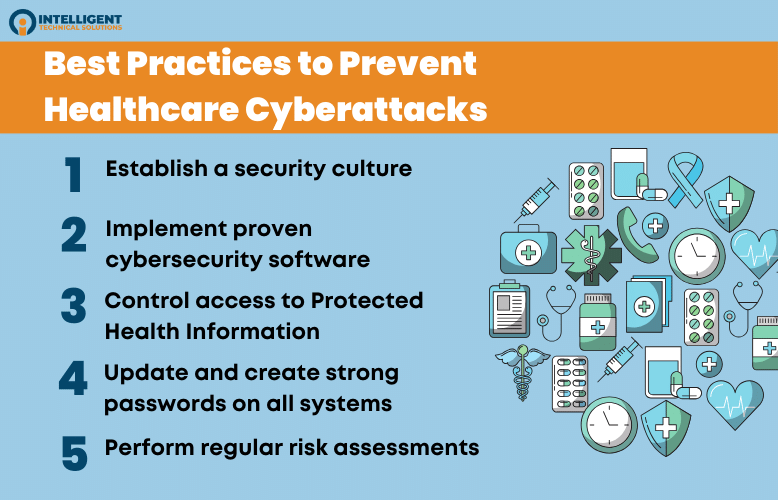Biggest Cybersecurity Challenges in Healthcare & How to Overcome Them
October 14th, 2022 | 4 min. read
%20(57).jpg)
The continuous digital transformation puts all industries at greater risk of cyberattacks, and the healthcare industry is no exception.
Cybersecurity is a must-have for any organization in the medical industry—from healthcare providers to insurers to pharmaceutical, biotechnology, and medical device companies.
It involves a variety of measures to protect organizations from external and internal cyberattacks and ensure the availability of:
- Medical services,
- Proper operation of medical systems and equipment,
- Reservation of confidentiality and integrity of patient data, and
- Compliance with industry regulations, which, if compromised, could put patient lives at risk.
However, as healthcare organizations rely on health information technology for data sharing, process automation, and system interoperability, they also become vulnerable to ransomware attacks, data theft, and endpoint compromise.
As a healthcare organization, what can you do to protect your network?
Intelligent Technical Solutions (ITS) will get you the answers to this question. We are a Managed Security Service Provider (MSSP) with years of experience helping healthcare organizations strengthen their network defenses.
In this article, we’ll go over the following:
- The most common healthcare cybersecurity challenges
- What healthcare organizations can do to prevent cyberattacks
We’ve reached out to Ed Griffin, one of our partners at ITS, to talk us through the importance of cybersecurity in healthcare, the challenges healthcare organizations face, and what to do to protect your business and your patients.
3 Most Common Healthcare Cybersecurity Challenges
Attacks on medical infrastructure are increasing, and the damage from those attacks is growing fast. To get to the bottom of these incidents, you need to know where gaps in cybersecurity come from. Here are some of the most common cybersecurity challenges in the healthcare industry:
1. Lack of patient privacy protection
 The healthcare industry is becoming more technologically connected; the risk of cyber theft is also significantly increasing.
The healthcare industry is becoming more technologically connected; the risk of cyber theft is also significantly increasing.
Suppose a healthcare organization has weak privacy protection for its patient. Hackers can penetrate patient and medical systems to steal and collect data, forcing healthcare organizations to pay a ransom to restore patient data systems.
At the same time, the threat may also come from inside the organization – particularly from your own staff. Your data becomes vulnerable due to the following:
- Curiosity or unwarranted access to data unrelated to care
- Convenience or security protocol shortcuts or bypasses
- Human error, especially when managing electronic health records (EHRs)
- Clicking on phishing emails
When you let your business stay vulnerable to threats, you risk decreasing business revenue and damaging your reputation. According to Griffin, “People would think that your healthcare institution is unsafe because you don’t practice good information security practices, and they’ll go to a different institution if they have that option.”
2. Vulnerabilities of legacy systems in healthcare
 Not replacing their legacy systems could be another risk to your network.
Not replacing their legacy systems could be another risk to your network.
Although legacy systems can still function, they are vulnerable to cyberattacks. They provide “back-door entry” for cybercriminals to access systems holding personal and medical data.
In addition to posing a danger to patients, data theft due to outdated systems can interrupt workflows and impact staff performance. Once a technology is outdated, finding the necessary support to address issues or fix problems becomes increasingly tricky.
3. Security breaches
 Technology has provided many benefits to the healthcare industry; it allows for better communication between doctors and patients and the automation of manual tasks.
Technology has provided many benefits to the healthcare industry; it allows for better communication between doctors and patients and the automation of manual tasks.
However, with its continuous development, healthcare technology has become an easy target for cyberattacks and data breaches.
In 2020, the healthcare industry saw hackers taking advantage of COVID-19 fears. Some of the most significant healthcare data breaches of 2020 came from fraud schemes, phishing attacks, and vulnerabilities in healthcare vendor systems, leading to sensitive patient data theft, insider threats, and hacked IoT devices.
Best Practices to Prevent Healthcare Cyberattacks
Cybersecurity incidents can impede a healthcare organization’s ability to provide necessary patient care. Your business must have strategies highlighting data safety and protection to prevent cyberattacks. If you want to guard your network, you can:

1. Establish a security culture
Protecting patients through good information security practices should be as second nature to the health care organization as sanitary practices. You may help raise cybersecurity awareness through regular training, so team members are aware of the risks and solutions.
Read: 10 Best Cybersecurity Tips & Practices in 2022 From Experts
More importantly, being a healthcare provider also requires you to adhere to certain compliance standards such as HIPAA. This regulation ensures that healthcare providers implement multiple safeguards to protect sensitive personal and health information.
2. Implement proven cybersecurity software
Cyber attackers primarily compromise computers through viruses. Even if your computers have all the latest security updates, it’s still at risk of infection from web downloads, email, and flash drives.
With anti-virus software, hackers won’t be able to steal data, destroy or deface it, and take control of your machine.
3. Control access to Protected Health Information (PHI)
You can also configure additional access controls, including role-based access control, in which a staff member’s role determines what information they may access. It is important, though, to ensure you assign staff to the correct positions and correctly set the access permissions for each role.
4. Update and create strong passwords on all systems
Not only are cybersecurity professionals responsible for healthcare cybersecurity, but everyone in your team also plays a role, even if it is simply updating and creating strong passwords regularly. Since attackers may use automated methods to try to guess a password, it is important to choose a password that does not have characteristics that could make it vulnerable.
According to Griffin, a lack of security practices can result in severe, life-threatening events. It is critical, especially for healthcare institutions, to keep their networks as secure as possible.
5. Perform regular risk assessments
Risk/benefit assessments, especially for legacy systems, allow organizations to identify the weak points in a network. Recovery planning should be in place so that when an emergency occurs, you have a clear procedure to follow.
Ready to Improve Your Healthcare Cybersecurity?
The best way forward for healthcare organizations like yours is to acknowledge the severe threat of the cyber war, assess your situation, and plan and implement a security strategy tailored to your industry.
At ITS, we help protect businesses from the risks of the ever-evolving cybersecurity landscape with managed IT and cybersecurity. Learn more about how managed IT can help your healthcare organization be cyber secure, boost operational efficiency, and lower technology costs by reading The Ultimate Guide to Managed IT for Healthcare.
Jess is a Content Writer who commits herself to creating helpful, relevant, and easy-to-digest technical articles. When she isn't writing, she devotes her energy (and money) to collecting K-Pop photo cards, which she likes to call an 'investment.'
Topics:
